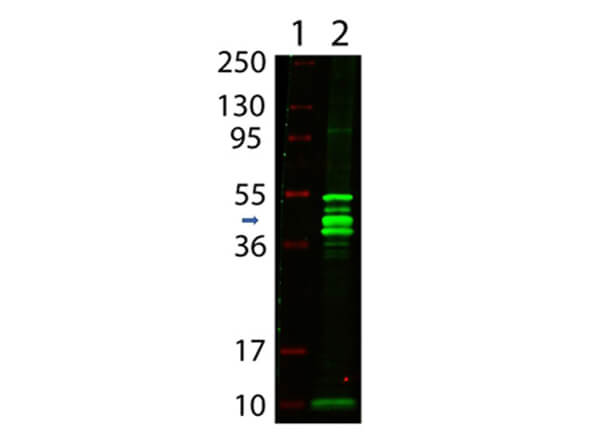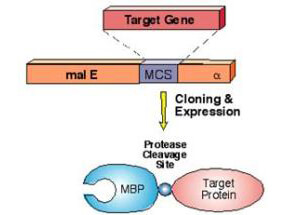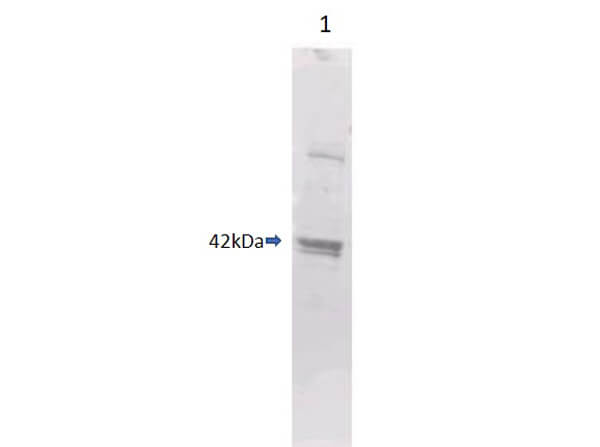Datasheet is currently unavailable. Try again or CONTACT US
Maltose Binding Protein (MBP) Epitope Tag Antibody
Rabbit Polyclonal
5 References
200-401-385
1 mg
Lyophilized
WB, ELISA, IF
MBP-Tag
Rabbit
Shipping info:
$50.00 to US & $70.00 to Canada for most products. Final costs are calculated at checkout.
Product Details
Anti-Maltose Binding Protein (MBP) Epitope Tag (RABBIT) Antibody - 200-401-385
rabbit anti-MBP Epitope Tag Antibody, rabbit anti-Maltose Binding Protein Antibody
Rabbit
Polyclonal
IgG
Target Details
MBP-Tag
Recombinant Protein
This antibody was purified from whole rabbit serum prepared by repeated immunizations with the MBP epitope tag recombinant protein.
This IgG purified antibody is directed against MBP and is useful in determining its presence in various assays. This polyclonal anti-MBP tag antibody detects over-expressed proteins containing the MBP epitope tag. To date this antibody has reacted with all MBP tagged proteins so far tested. In western blotting of bacterial extracts the antibody does not cross-react with endogenous proteins.
Application Details
ELISA, WB
IF
- View References
Anti-MBP is optimally suited for monitoring the expression of MBP tagged fusion proteins. As such, anti-MBP/MBP can be used to identify fusion proteins containing the MBP epitope. The antibody recognizes the MBP epitope tag fused to the amino- or carboxy- termini of targeted proteins. This antibody has been tested by ELISA and western blotting against MBP containing recombinant proteins. Although not tested, this antibody is likely functional for immunoprecipitation and immunocytochemistry, and other immunodetection techniques. Maltose binding protein is a bacterial protein, which is often used in protein expression studies because it creates a stable fusion product that does not appear to interfere with the bioactivity of the protein of interest. It also allows for its easy purification from bacterial extracts under mild conditions. Anti-MBP is a companion to the pMAL protein expression system and can be used for the detection and purification of MBP-fusion proteins expressed in E. coli. By Western blot, a band is seen at ~ 42 kDa representing MBP.
Formulation
1.0 mg/mL by UV absorbance at 280 nm
0.02 M Potassium Phosphate, 0.15 M Sodium Chloride, pH 7.2
0.01% (w/v) Sodium Azide
None
1.0 mL
Restore with deionized water (or equivalent)
Shipping & Handling
Ambient
Store vial at 4° C prior to restoration. For extended storage aliquot contents and freeze at -20° C or below. Avoid cycles of freezing and thawing. Centrifuge product if not completely clear after standing at room temperature. This product is stable for several weeks at 4° C as an undiluted liquid. Dilute only prior to immediate use.
Expiration date is one (1) year from date of receipt.
Epitope tags are short peptide sequences that are easily recognized by tag-specific antibodies. Due to their small size, epitope tags do not affect the tagged protein’s biochemical properties. Most often sequences encoding the epitope tag are included with target DNA at the time of cloning to produce fusion proteins containing the epitope tag sequence. This allows anti-epitope tag antibodies to serve as universal detection reagents for any tag containing protein produced by recombinant means. This means that anti-epitope tag antibodies are a useful alternative to generating specific antibodies to identify, immunoprecipitate or immunoaffinity purify a recombinant protein. The anti-epitope tag antibody is usually functional in a variety of antibody-dependent experimental procedures. Expression vectors producing epitope tag fusion proteins are available for a variety of host expression systems including bacteria, yeast, insect and mammalian cells. Rockland Immunochemicals produces anti-epitope tag antibodies against many common epitope tags including Myc, GST, GFP, 6X His, MBP, FLAG and HA. Rockland Immunochemicals also produces antibodies to other tags including FITC, Rhodamine (TRITC), DNP and biotin.
Nieweglowska ES et al. (2023). The ϕPA3 phage nucleus is enclosed by a self-assembling 2D crystalline lattice. Nat Commun.
Applications
IF, Confocal Microscopy
González et al. (2018). Shaping Substrate Selectivity in a Broad-Spectrum Metallo-β-Lactamase. Antimicrobial Agents and Chemotherapy
Applications
WB, IB, PCA
Johnson et al. (2018). Homeodomain Proteins Directly Regulate ATM Kinase Activity. Cell Reports
Applications
WB, IB, PCA
Gonzalez LJ et al. (2016). Membrane anchoring stabilizes and favors secretion of New Delhi metallo-β-lactamase. Nat Chem Biol.
Applications
WB, IB, PCA
Meyer, MR et al. (2015). Evidence for intermolecular interactions between the intracellular domains of the arabidopsis receptor-like kinase ACR4, its homologs and the Wox5 transcription factor. PloS One
Applications
WB, IB, PCA
This product is for research use only and is not intended for therapeutic or diagnostic applications. Please contact a technical service representative for more information. All products of animal origin manufactured by Rockland Immunochemicals are derived from starting materials of North American origin. Collection was performed in United States Department of Agriculture (USDA) inspected facilities and all materials have been inspected and certified to be free of disease and suitable for exportation. All properties listed are typical characteristics and are not specifications. All suggestions and data are offered in good faith but without guarantee as conditions and methods of use of our products are beyond our control. All claims must be made within 30 days following the date of delivery. The prospective user must determine the suitability of our materials before adopting them on a commercial scale. Suggested uses of our products are not recommendations to use our products in violation of any patent or as a license under any patent of Rockland Immunochemicals, Inc. If you require a commercial license to use this material and do not have one, then return this material, unopened to: Rockland Inc., P.O. BOX 5199, Limerick, Pennsylvania, USA.



